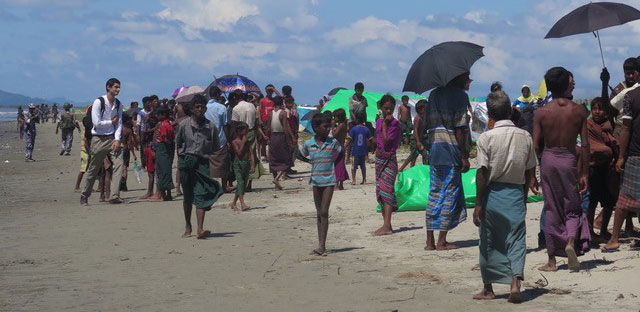Rakhine communities say Myanmar’s shadow civilian National Unity Government’s (NUG) policy on Rohingya does not represent Rakhine people.
The NUG, formed by elected lawmakers in mid-April to rival the military regime, on June 3 said it will replace the 1982 Citizenship Law with legislation offering the Muslim community citizenship and scrap the National Verification Cards that identify the Rohingya as foreigners.
The Muslims in Rakhine State identify as Rohingya but are labeled ‘Bengali’ by many to imply they are illegal immigrants from neighboring Bangladesh. They are denied citizenship and freedom of movement by the authorities.
The All Arakanese Solidarity Committee (AASC), a Rakhine State-based network of civil society organizations, community leaders and politicians, and the Arakan Liberation Party (ALP) have released statements in opposition to the NUG’s Rohingya policy.
ALP spokesman Lieutenant Colonel Khaing Kyaw Hlaing said: “Everyone knows the Bengali issue is sensitive in the country. The NUG was only formed recently and our party says a nascent government should not be making these decisions without consulting Rakhine revolutionary groups, stakeholders and civil society organizations.”
The ALP signed the Nationwide Ceasefire Agreement in October 2015 under U Thein Sein’s administration.
The NUG’s move will complicate the issue while the state is starting to see stability after two years of fighting, the group said. The issue should not be used by any party or government, said the ALP.
The AASC said the NUG’s policy will be unpopular with the Rakhine population and risk disrupting peace and stability.
The statement says the Rakhine people accept the rights of an ethnic group to choose its name freely. But it said the choice of name is intended to distort the history and identity of indigenous ethnic groups and could impact on Rakhine territory, politics and society, directly threatening the future of the Rakhine community and other ethnic minorities in the state.
It is a politically motivated move to seek international recognition and assistance, said the AASC.
The AASC declined to comment to The Irrawaddy.
Coup leader Senior General Min Aung Hlaing told Chinese-language Phoenix TV in May: “There are no Rohingya. It is just an imaginary name. It is not an officially recognized ethnicity. We don’t recognize it.”
While some Rakhine politicians and people have shown sympathy for the Rohingya, who have been persecuted by Myanmar’s military, and agree that they should have fundamental rights, many oppose their official recognition as an ethnic group called “Rohingya”.
Some Rakhine communities fear being swallowed up by the Muslim community as a result of Rohingya recognition as an indigenous ethnic group.
Britain-based Myanmar Rohingya Association chairman U Tun Khin said: “I think Rakhine brothers have a little misunderstanding. We would like to hold talks with our Rakhine brothers as well as the NUG. This problem can be solved through negotiations between the NUG, Rakhine and Rohingya. I think Rakhine people will understand when the time comes.”
The Arakan Army (AA), which has considerable influence in the state, has declined to comment on the NUG’s policy.
In 2019, AA chief Major General Tun Myat Naing told The Irrawaddy that Rakhine people needed to get along with the Muslim community if Rakhine State was to achieve stability and development.
Communal strife broke out between Rakhine Buddhist and Muslim communities in 2012.
After the Arakan Rohingya Salvation Army allegedly launched attacks on Myanmar’s security forces on Aug. 25, 2017, the military led a crackdown consisting of “clearance operations” that pushed more than 740,000 Rohingya Muslims into neighboring Bangladesh.
The international community has called the military’s treatment of the Rohingya genocide.
When in 2019 the Gambia filed a genocide case against Myanmar at the International Court of Justice, the United Nation’s highest court, State Counselor Daw Aung San Suu Kyi defended Myanmar’s military against genocide allegations.
You may also like these stories:
Myanmar’s National Unity Government ‘Deeply Concerned’ With China
Myanmar’s Parallel Govt Calls on Civilians to Report Regime Atrocities for Prosecutions
Myanmar Junta to Sell More Timber in Search for Hard Currency

















